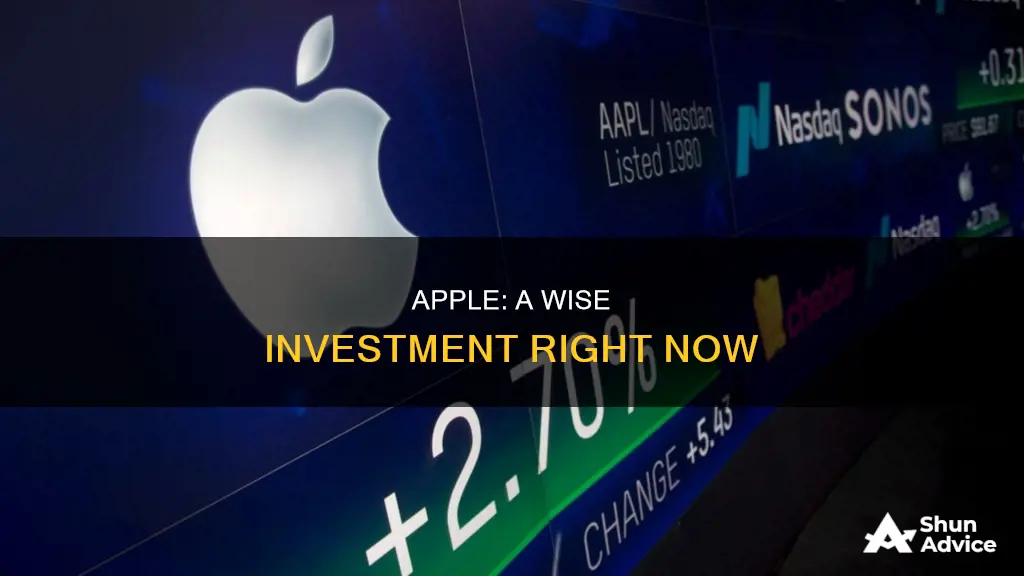
Apple has been one of the best-known brands in the world, selling in-demand hardware products that consumers pay premium prices to own. Apple shares have climbed 817% in the last decade, and rose 48% in 2023, beating the Nasdaq Composite.
Apple's success is largely due to its iPhone, which accounted for 52% of its revenue in the last fiscal year. The iPhone only represents about 20% of global smartphone shipments, but due to its pricing power, it accounts for roughly 80% of the industry's operating income.
Apple's services segment, which includes Apple Pay, iCloud, News, Music, and TV+, has also been expanding faster than its products in recent times. In fiscal 2023, services saw revenue increase by 9%, representing 25.9% of its total revenue.
Apple's aggressive share repurchasing program has also supported its share price. In the last five years, the company's outstanding share count has been reduced by 21%.
However, Apple's stock is expensive, trading at a price-to-earnings ratio of 29.8, significantly more than its trailing 10-year average of 20.8. The core iPhone market is also reaching a saturation point, and Apple will need to continue to roll out competitive devices and services to continue to monetise its customers and justify its nearly $3 trillion valuation.
What You'll Learn

Apple's brand loyalty and ecosystem
The Apple ecosystem refers to the seamless integration and optimisation of Apple's range of products and services, including iPhones, iPads, Apple Watches, and the applications that run on them. This ecosystem is praised for its ability to unlock extra features when Apple products are paired together, providing a unified experience for users.
- Relieving Purchasing Anxiety: Apple addresses customers' anxiety about product functionality and support by offering a 1-year warranty and repair or replacement services at no extra cost. The extensive network of Apple retail stores and authorised service providers makes it convenient for customers to seek assistance.
- Attention to Detail: Apple is known for its obsessive attention to detail, ensuring that its products, packaging, and even store designs exceed expectations. This attention to detail enhances the customer experience and showcases Apple's commitment to excellence.
- Focus on Employee Satisfaction: Apple recognises that happy and satisfied employees are more productive and engaged. By conducting regular surveys, offering training sessions, and creating a supportive work environment, Apple ensures that its employees are brand advocates, which positively impacts customer interactions.
- Unique Customer Experiences: Apple prioritises creating unique and personalised customer experiences. From innovative website designs to stylish advertisements and sleek product designs, Apple delivers an exclusive experience that makes customers feel valued.
- Innovation: Apple's focus on innovation has led to the development of unique hardware and software, such as AirPods and Apple Watch. By anticipating customer needs and delivering on their promises, Apple has established itself as a leader in the technology industry.
- Consistency: Apple maintains consistency in its branding and marketing messages, ensuring that customers instantly recognise its products and associate them with the brand's identity. This consistency builds trust and reinforces Apple's position in the market.
- Customer Value over Money: Instead of solely focusing on profits, Apple prioritises customer value. By understanding consumer preferences and delivering high-quality products, Apple has built a loyal customer base that is willing to pay a premium for its innovations.
- Seamless Integration: The Apple ecosystem allows users to move seamlessly between their Apple devices, such as phones, computers, and tablets. Similar interfaces, settings, and workflows link tasks and enable efficient file transfers, communication, and media creation across multiple devices and operating systems.
- Privacy and Security: Apple emphasises privacy and security as key components of its ecosystem. The company has introduced advanced security features to protect cloud data and communications, positioning itself as a trusted steward of user data.
- Unlocking Extra Features: Apple incentivises customers to stay within its ecosystem by offering exclusive features and functionalities when multiple Apple products are paired together. This creates a "walled garden" effect, making it challenging for users to switch to competitor devices.
In summary, Apple's brand loyalty and ecosystem are underpinned by the company's commitment to delivering exceptional products and experiences, understanding consumer behaviour, and creating a seamless and integrated digital environment for its customers. These strengths have contributed to Apple's success and established it as one of the most valuable and influential brands globally.
Turkey: Invest Now or Later?
You may want to see also

Apple's share repurchase program
In 2020, Apple borrowed $8.5 billion in four batches with varying interest rates and maturities to fund share buybacks, taking advantage of low-interest rates. This added to their already substantial cash reserves, with over $83 billion in net cash and marketable securities as of March 28, 2020. The company's strong balance sheet and ability to generate substantial free cash flow have positioned it well to continue its share repurchase program, even during challenging economic times.
The share repurchase program has been a significant factor in Apple's financial strategy, reducing the number of outstanding shares and increasing earnings per share. In the last five years leading up to 2024, the company's outstanding share count has been reduced by 21%. This has contributed to Apple's strong financial performance and profitability, with the company's operating margin averaging an impressive 27.9% over the past decade.
In summary, Apple's share repurchase program has been a key component of its capital allocation strategy, allowing the company to return value to shareholders, enhance financial metrics, and maintain financial flexibility. The program has contributed to Apple's strong financial position and performance over the years, making it an attractive investment opportunity for many.
Rwanda's Education: Invest in the Future
You may want to see also

Apple's high-quality devices
A key advantage of Apple's products is that the company controls both the software and hardware development in-house, with no open sourcing. This creates an ecosystem in which each Apple device can be paired seamlessly, offering greater connectivity and functionality to users who are loyal to the brand. This ecosystem is exclusive to Apple devices, and the more users invest in it, the more rewarding it becomes.
Apple's devices are also known for their ease of use, with simple and intuitive operating systems. This has contributed to the iPhone's dominance among mobile phone users, with more than half using Apple devices over the past decade.
In addition to smartphones, Apple has a range of other popular hardware products, including the Apple Watch, AirPods, MacBook, and iPad. These products have a high resale value and tend to outlive their competitors, further contributing to their reputation for quality.
Apple's commitment to technological innovation is another key factor in the high quality of its devices. The company has been a thought leader in Silicon Valley for many years, with advancements such as the M1 CPU chips revolutionizing the CPU industry.
To maintain its position at the forefront of the tech industry, Apple invests heavily in research and development. According to Statista, the company's R&D budget has been as high as $20 billion. This significant investment in innovation helps to ensure that Apple's devices remain high-quality and competitive in the market.
Invest Wisely in People, Shape Your Legacy
You may want to see also

Apple's history of innovation
Apple has a long history of innovation, from its inception to the present day. The company's co-founder, Steve Jobs, was instrumental in driving this innovation, from the Apple II in the 1970s to the iMac, iPod, iTunes, iPhone, iPad, and the App Store.
When Steve Jobs returned to Apple in 1997, he restructured the company, removing the general managers of all the business units, putting the entire company under one P&L, and combining the functional departments of the business units into a single functional organisation. This structure is more common for small entrepreneurial firms, yet Apple retains it today, despite its size and complexity.
Since Jobs' death in 2011, Apple has continued to innovate with products like Siri, Touch ID, Apple Pay, CarPlay, and the Apple Watch. These innovations have redefined how we interact with devices, from biometric security to payments and the automotive industry.
Apple's innovations have not only sold well but also driven the creation of new markets, industries, and lifestyle habits. The company's installed base of over 2.2 billion devices, including more than 1 billion iPhones, is a testament to its success.
- Apple II (1976): The first "total package" computer for the average consumer, co-designed and built by Steve Jobs and Steve Wozniak.
- Macintosh (1984): The first commercially successful computer with a mouse and a graphical user interface.
- IPod and iTunes (2001): Disrupted the music industry, allowing users to carry 1,000 songs in their pockets.
- IPhone (2007): A game-changing smartphone that sparked massive growth and created a loyal customer base.
- IPad (2010): The first successful tablet computer, featuring a touchscreen adapted from the iPhone.
- Apple Watch and Apple Pay: Brought wearable computing and electronic wallet payments into the mainstream.
- CarPlay: Revolutionised the automotive infotainment system by allowing users to overlay their iPhone interface and data on their car's system.
Investment Calls: Why You?
You may want to see also

Apple's services segment
The services segment includes things like Apple Pay, iCloud, News, Music, TV+, AppleCare, and Apple Arcade. Services have been expanding faster than products in recent times. In fiscal 2023, services saw a revenue increase of 9%, representing 22% of the company's overall sales. As the revenue from services increases, so too does profitability, as this division carries a gross margin of 71%.
The services segment is also important for driving customer loyalty and stickiness. Services give consumers less reason to leave for competitor offerings.
In the March quarter, Apple's services revenue increased 14% year-over-year to a record high of $23.9 billion. In the second quarter of 2024, Apple generated $23.87 billion in services revenue. Of Apple's $259 billion in trailing-12-month revenue, $44 billion came from services, compared to $146 billion from the iPhone. Services revenue rose 18% year-over-year during this period, compared to 2% growth for Apple's consolidated top line.
In fiscal Q3, services accounted for 21% of revenue but 36% of fiscal Q3 gross profit, due to its high gross profit margin of 64%.
Vodafone Idea: Right Issue Investment Guide
You may want to see also
Frequently asked questions
Apple is the largest company in the world by market capitalisation. It has a market cap of around $3 trillion and is the most valuable company in the U.S. market.
Apple's business model relies heavily on iPhone sales, which accounted for over half of its revenue in 2022. A slowdown in this market could impact earnings. Additionally, Apple's large-scale share buyback programme may impact future innovation.
Apple has a strong track record of innovation and a loyal customer base. Its shift in focus from device sales to services revenue could provide further margin upside. Apple also has a history of treating shareholders well, with a generous capital return programme and quarterly dividends.







